Petrochemical Nonwoven Automotive Seating 20-12-2019 - Arhive
Petrochemical Nonwoven Automotive Seating
-Crude Oil Prices Trend

-Arburg Freeformer 300-3X to make Asia market debut at TCT Asia
German injection moulding leader Arburg will bring its Freeformer 300-3X additive manufacturing system to the Asian market for the first time at TCT Asia 2020.
The Shanghai event, which returns for its sixth year on 19-21 February, will feature live demonstrations of the 300-3X 3D printing functional parts with a combination of hard and soft properties and support structure.
The large format system made its debut at Formnext last year and leverages the ARBURG Plastic Freeforming (APF) process with a larger build volume (up to 234 x 134 x 230 millimetres) and higher temperatures within the build chamber up to 200 degrees Celsius.

-Next-Generation Aerospace Filtration
Keeping dust from reaching the internal workings of any engine is critical. Whether a business operates an Airbus or a regional aircraft fleet, one thing they all have in common is recurring air filter maintenance. The AEROGrAFT Spearhead Project, announced by the Graphene Flagship, is set to produce heatable aero-graphene foams, to reduce the cleaning time of aero-material filters in the areospace industry, saving businesses huge sums of maintenance costs and downtime.
Developed in collaboration with Naturality Research & Development, Spain and Lufthansa Technik, Phi-Stone, and Sixonia Tech in Germany, the AREOGrAFT Spearhead Project is on a mission to develop prototype self-cleaning air filters that use areo-graphene foam.
Developed with graphene’s homogenous heat distribution properties in mind, the graphene-enabled foam will ensure even heat throughout the air filter, to elicit a consistent cleaning across all air filter surfaces.

-DOMO to source renewable energy for nylon film production
DOMO Film Solutions has announced that it will start sourcing 100 per cent renewable energy for the production of its nylon film from January 2020.
The move reflects DOMO’s continuous commitment to providing low-carbon nylon film.
MD Attilio Annoni said: “Thanks to this reduction in carbon footprint, NYLEEN has made another step forward towards offering industry a sustainable nylon film solution as we continue to improve our production processes. This family of nylon films has a proven low carbon footprint and this use of renewable energy will help to lower that even further.”
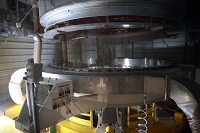
-FCA passenger cars to move to PSA platforms
In outlining the industrial side of their merger, PSA Group and Fiat Chrysler Automobiles said that more than two-thirds of their production would be concentrated on just two platforms, with 3 million cars per year on a compact/midsize platform and 2.6 million on a small platform.
The smaller platform will be PSA’s CMP architecture and larger cars will be on the group’s EMP2, industry sources told Automotive News Europe. Ram pickups and larger Jeep models will continue to use FCA underpinnings.

© Tex Tech Industries.Tex Tech Industries, headquartered in Portland, Maine, has been working on a project with the Institute for Composite Materials (IVW) in Germany on the issues of the high lay-up requirements and sensitivity to delamination when using 2D textile fabrics and the difficulties in impregnation when using thicker 3D woven fabrics.
The research team believed that by integrating through-thickness oriented fibres in 3D woven fabrics, they could achieve more promising results from through-thickness permeability tests.
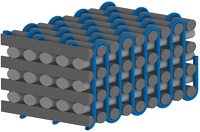
-Goal 2020, surviving cotton: a roller-coaster decade for raw materials
Cotton, one of the main raw materials of the fashion industry, reached record highs in 2011 and again hit lows just three years later.
The global raw materials market has lived one of its busiest decades. Cotton, one of the main raw materials of the fashion industry, reached record highs in 2011 and again hit lows just three years later. The lesson that retailers took from these was that it is necessary to stabilize raw materials market and give it continuity over time. Part of the answer to this shift of paradigm is circularity.

-China, Russia propose lifting some UN sanctions on North Korea, U.S. says not the time
China and Russia on Monday proposed the UN Security Council lift a ban on North Korea exporting statues, seafood and textiles, according to a draft resolution seen by Reuters, in a move Russia said is aimed at encouraging talks between Washington and Pyongyang.
The draft also called for a ban to be lifted on North Koreans working abroad and the termination of a 2017 requirement for all such workers to be repatriated by next week. The draft would also exempt inter-Korean rail and road co-operation projects from UN sanctions.

-The Ocean Cleanup successfully brings first plastic waste haul to land
The Great Pacific Garbage Patch now has a little less plastic trash thanks to an eco-friendly cleanup project.
The Ocean Cleanup is celebrating a big win. For the first time, the non-profit organization successfully brought to shore multiple large bags that were filled with plastic trash it pulled from the infamous Great Pacific Garbage Patch.
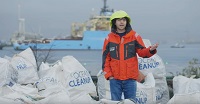
-Water bottler turns to KHS to improve sustainability
For the pre-holiday edition of Best Practices, we travel to sunny Florida, where the family-owned Silver Springs Bottled Water Co. has installed a KHS InnoPET TriBlock blow molder/labeler/filler block for running PET bottles.
Actually, the Richmond family now has 11 KHS production lines in what has become a long-term partnership. The husband-and-wife team of Karl and Margaret Richmond bought Silver Springs Bottled Water in 1991.
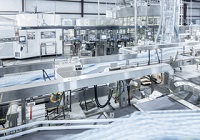
-NAPCOR: PET bottle recycling rate remains near 29%
More PET bottles were collected for recycling last year, but the overall recycling rate remains stagnant, according to an industry report.
The annual report from the National Association for PET Container Resources (NAPCOR) shows over 1.8 billion pounds of PET bottles were collected in the U.S. for recycling in 2018, up 5% over the previous year.
But the U.S. recycling rate for those bottles remained roughly flat at 28.9%, compared to 29.2% in 2017, because generation increased. The rate is calculated by dividing total PET bottles recycled domestically and exported by the total used in U.S. bottles.
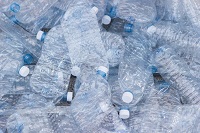
Petrochemical Nonwoven Automotive Seating
